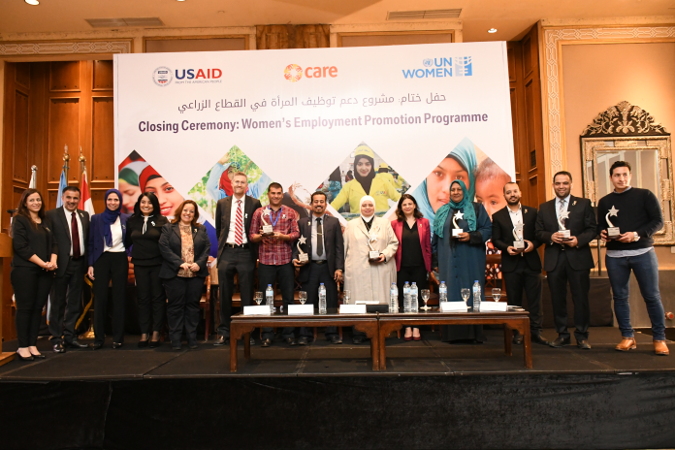Private Sector taking remarkable steps for inclusive decent employment opportunities for women in the Agribusiness Sector: “Marking the Achievements of Women’s Employment Promotion Programme”
Date:

The United Nations Entity for Gender Equality and the Empowerment of Women (UN Women) marks today the closing of “Women’s Employment Promotion Programme” (WEPP). The programme was funded with a generous support from the United States Agency for International Development (USAID) and is implemented in partnership with CARE International in Egypt.
The event started with opening remarks by Ms. Blerta Aliko, UN Women Country Representative; Mr. Brinton Bohling Director of Economic Growth Office at USAID and Ms. Vivian Thabet Deputy Country Director, CARE International in Egypt. This conference aimed at celebrating the project’s overall results and on-ground achievements reached throughout the programme’s interventions since 2015. The efforts implemented through WEPP aimed at creating a more gender- inclusive environment along the agricultural value chains, through improving the working conditions for female employees in the agribusiness firms with the objective to reposition themselves as models in gender-balanced workplace policies, attitudes, and inclusive work environments.
“In Egypt, women account for a significant proportion of the agribusiness workforce throughout the agricultural value chain, providing inputs and functions that are critical to business performance. We are celebrating today the achievements on one of our projects that targeted women in this sector affirming our strong shared belief in the importance on their decent employment and equal inclusion leading to the wellbeing of the entire community. This year, rural women have gained global attention at UN Commission on the Status of Women. A blueprint was delivered to ensure the rights and development of rural women and girls while stressing on the urgency of eliminating the structural barriers that rural women and girls face in efforts to achieving gender equality,” stated Ms. Blerta Aliko; UN Women Country Representative.
The project was implemented in Giza, Beni Suef, and Minya and succeeded in stationing around 225 women at 10 firms working in the agricultural sector. Another achievement of the project is offering the targeted women fixed-term job contracts, a monthly salary including bonuses, lunch allowances, child-care facilities, and safe transportation coupled with social protection and medical insurance. This breakthrough translates into an annual salary of 4,050,000 EGP that empowers marginalized women economically and benefits their families, communities and local rural economy.
The project also supported the formation and capacity development of village savings and loans associations (VSLA) groups which are saving and lending modality for workers. The VSLA groups saved up to 30,000 Egyptian pounds, which – in addition to - being a solidarity group for financial and additional income generation – they act as a communication platform with the firms. Furthermore, the project succeeded in networking with 7 Community Development Associations (CDAs) and improving the working conditions for around 1,686 women (seasonal and permanent labor) at the target 10 firms by providing them with 3 child-care facilities, women’s restrooms renovations, equipment for safety, mobile lavatories, transparent complaint system and trainings on different topics such as vocational training, personal hygiene and sexual harassment.
“The American people are proud to play a role in empowering Egyptian women,” said USAID Economic Growth Director Brinton Bohling. “These ten firms have given women in agribusiness a voice – a voice that we hope echoes across Egypt and encourages other firms to implement similar policies and measures for women’s inclusion in the workplace.”
Read Arabic